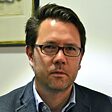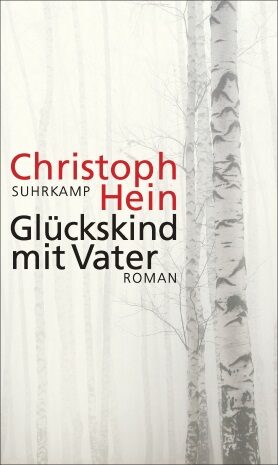Christoph Hein
Glückskind mit Vater
[Portrait of a Son with Father]
- Suhrkamp Verlag
- Berlin 2016
- ISBN 978-3-518-42517-6
- 527 Pages
- Publisher’s contact details
Christoph Hein
Glückskind mit Vater
[Portrait of a Son with Father]
Published in Arabic with a grant from Litrix.de.
Sample translations
The burden of ancestry and the snares of fortune
Through his family, Konstantin comes to learn that there are different ways to go on living despite inheriting a fraught legacy. His mother dissociates herself from her husband completely, reverts to her maiden name, and tries to keep her two children away from their father’s dark inheritance by teaching them foreign languages and raising them in a wholly different spirit. Yet Gunthard, the older son, is fascinated by this unknown father, by his former power and prestige, still palpable in the little East German town where he lives. Konstantin, on the other hand, is oppressed by his father’s guilt, and wants to get rid of the blemish he was born with, to escape from this nightmare and spectre that increasingly hounds him. Thus he tries to flee – and ends up confronted time and again with what he was trying to leave behind and would really like to obliterate. The burden of ancestry does not get smaller but only seems to grow with every step he takes on the road of life.
The award-winning Christoph Hein, born in 1944, is one of Germany’s most famous writers. In plays, prose, and essays he frequently grapples with the dislocations of history and their effects on individual fates. His latest novel tells the life story of his protagonist as the ultimately failed attempt to step out of the shadow of the past by trying to run away from it.
Having not yet come of age, Konstantin Boggosch hatches a radical plan to leave his city and country behind him and go to a faraway place where no one knows him, where he’ll join the Foreign Legion, the most extreme act of renunciation he can imagine. He does actually make it to Marseille in the late 1950s, but comes to realize that this military organization is not all it’s cracked up to be. He meets an old antiquarian bookseller who hires him as a translator and delivery boy and soon introduces him to his friends, whom the young man begins to work for too. Yet even here, so far away from home, the past catches up with him. It turns out the old man’s Marseille friends were part of a resistance group during the war who were betrayed and arrested. From their stories of life in the camps and their mistreatment at the hands of a certain SS man named "Vulkan," Konstantin comes to believe that the man must have been his father. Shamed and worried that these comrades might recognize him as the son of their onetime tormentor, he leaves France and returns to the GDR.
But the wheel of history continues to turn. The building of the Berlin Wall complicates his return and his long stay abroad makes him a dubious figure. What drives him is the hope that, by having gone away, the last traces of his family ties will now be obliterated: "No one knew about my father, I could forget him. I could delete him. Erase him. Wipe him out. File him away under Never Again." But his hopes turn out to be deceptive. For all his attempts to start a new life following his creative and pedagogical talents, first as a budding film student, then as a school director, the record of his family history becomes the bane of his existence, closing all the doors that had once been open to this former child of fortune. What began with the assurance of leaving behind his fatal past by means of personal commitment and self-knowledge ends in despair and resignation: "I know that I’ll never be rid of this father, this legacy. I’m unable to liberate myself from him, I’m not free. Because of him. It’s because of him that I have no children, that I don’t want them. I feared that something would be perpetuated. I didn’t want children, afraid as I was of evil, afraid of the ghosts of my father. […] I’m afraid that the demon will remain alive through me."
With his very personal novel Portrait of a Son with Father, one that has ties to his own biography, Christoph Hein has succeeded in creating a masterful work of literature about individual and collective repression, a brilliant exploration of freedom and guilt and the limits of happiness. It is also an object lesson that the past can be a spider’s web – one you get caught in more and more, the more you try to free oneself.
Translated by David Burnett

By Matthias Weichelt
Matthias Weichelt is Editor-in-Chief of the journal Sinn und Form. He writes for a number of publications including the "Frankfurter Allgemeine Zeitung" and the "Neue Zürcher Zeitung".
Publisher's Summary
What does Konstantin Boggosch, whom his mother described as child of fortune, owe to his father? In Christoph Hein’s new novel, which mobilises all the registers of his storytelling prowess and his historicaldiagnostic skills, the father is the driving force. But by no means in a positive sense: ever since his birth in 1945, the son, now growing up in the early days of the GDR, has been trying to get away from his war criminal father: psychologically, physically, professionally, geographically, even in his love life.
He makes numerous attempts to step outside his father’s shadow: he assumes a new name, tries to join the Foreign Legion in Marseilles, moves back to the GDR just after the Wall was built, but isn’t allowed to finish secondary school there; nevertheless, he is able to make the most of fortunate circumstances – he is a child of fortune after all – to become the principal of a grammar school by the end of the GDR. A success story… almost.
In the end he realises that an emancipation from collective and his personal history is doomed to failure. The imbrications of past and present make the child of fortune into a child of misfortune. And in this way he comes to embody all the political, social, and private realities of Germany. With irony and humour, movingly but without sentimentality or sarcasm, Christoph Hein tells the story of an extraordinary and yet paradigmatic life over more than sixty years of German history.
(Text: Suhrkamp Verlag)
